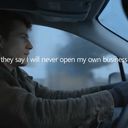Microsoft's game-changing Super Bowl ad for AI

Artificial intelligence won't steal your job, Microsoft's Super Bowl ad promised on Sunday — instead, it will help you fulfill your dreams.
Why it matters: The 60-second spot deftly reframed AI for the general population, transforming it from a scary unknown novelty into a catalyst for personal and professional growth.
Catch up quick: The ad for Microsoft's AI Copilot rolls out a diverse parade of everyday people who list their thwarted ambitions.
- "They say I will never open my own business"... "get my degree"... "make my movie" ... "build something" .... "They say I'm too old to learn something new" ... "too young to change the world."
That's the first 30 seconds. In the second half, we see each dream brought to life — thanks to timely creative and organizational help from Microsoft's Copilot AI bot, which responds to each user's inquiry: "Yes, I can help you."
Between the lines: Microsoft's ad taps into a long vein of Silicon Valley utopian thought centered on the power of personal computing to enrich individual lives.
- That tradition goes all the way back to Apple's 1984 Super Bowl ad unveiling the Macintosh, directed by Ridley Scott, in which an Orwellian dystopia full of conformist zombies gets liberated by a projectile flung by a revolutionary sprinter.
- Microsoft's ad this year was very much a move onto Apple's turf and a deliberate challenge to the iPhone maker's positioning as the favorite of creative types and "think different" individualists.
Microsoft wants the world to see the AI it is spending billions on as a boon to our humanity and a vehicle for personal liberation no less revolutionary than computers and smartphones seemed in their youth.
- Google's Super Bowl ad similarly showed off an AI-driven feature of the latest Pixel phone that helps blind or low-vision people take photos.
Be smart: Ads don't sell products by saying "You're fine just as you are."
- Microsoft's spot tells viewers that they're going to need Copilot — if not to live out their own dreams, then just to keep up with all these go-getter early AI adopters who are.
The other side: The ad touts how Copilot can provide tutorials, designs and code.
- It leaves out all the actual human tutors, graphic designers and programmers whose labor is being bypassed — and whose know-how was slurped up by AI models without consent or compensation.
Our thought bubble: By setting up its ad with portraits of individuals beleaguered by a nameless, deprecating "they," Microsoft's ad also tries to connect with the resentful mood of some Americans who feel left behind by "elites."
- Microsoft wants them to know that technology is not their enemy — but it's not clear who is.
By the numbers: Surveys show the American people evenly divided over whether they think AI will help or hurt them.
The bottom line: It's still early in the fight to define AI in the public imagination, and tech giants are burning big ad budgets to lock in a warm-fuzzy feeling around the technology. That glow may or may not survive widespread hands-on experience with AI products.